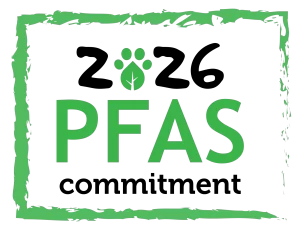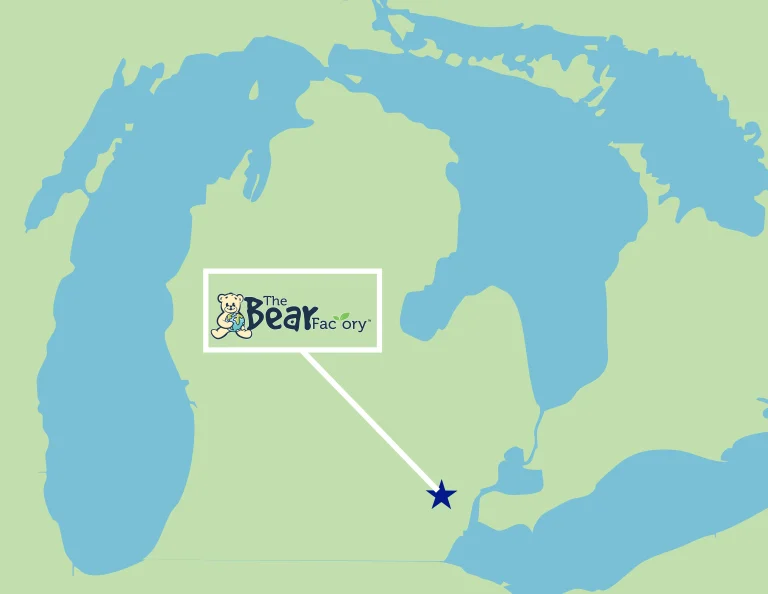Teddy Time Blog
Made with Sustainable Materials: Environmental Sustainability in Action
At The Bear Factory, environmental sustainability is not a trend, it’s a fundamental commitment that shapes every product we create and every decision we make. As we look toward the future of responsible toy manufacturing, we continue to deepen our transparency, refine our materials, and lead with intention. The introduction of our “Made with Sustainable Materials Paw Print iD” transparency iD in 2025 is a reflection of these efforts, helping customers and partners better understand the environmental impact behind our products.

The identification is more than a label, it’s a symbol of progress grounded in a 2024 company-wide materiality assessment. This process allowed us to identify and prioritize the environmental factors most relevant to our operations, customers, and industry. The insights gathered directly informed our shift toward more responsible product inputs and elevated our ability to design with purpose. The new transparency, Paw Print ID launched in early 2025, communicates exactly how much recycled or responsibly sourced material is used in each product, creating a clear link between transparency and impact.
Throughout this journey, we have aligned our actions with recognized global standards, integrating environmental management systems (EMS), and aligning operations with ISO 14001, which is a framework for environmental responsibility, and ISO 9001:2015, which ensures consistent product quality. We’ve also embraced our product life cycle assessment (LCA) as a tool to evaluate the environmental footprint of each plush toy from raw materials to end-of-life, allowing us to identify ways to reduce emissions, waste, and resource consumption.
Another vital concept guiding our approach is circularity. This design principle encourages product reuse, recycling, and minimal waste. From replacing plastic hang ties with biodegradable cotton string to pre-filling our plush toys with recycled polyfiber, our design choices are rooted in circular thinking. Maintaining a clear chain of custody for every material used, and ensuring it’s responsibly sourced and traceable, is also essential for maintaining our high standards for ethical manufacturing.
One standout example of this commitment is our proactive response to the presence of per- and polyfluoroalkyl substances (PFAs) in a limited number of fabric-based accessories. PFAs, often referred to as “forever chemicals,” are synthetic substances that do not break down easily in the environment or the human body. Linked to a range of health concerns, from hormonal disruptions to cancer, PFAs have no place in products designed for children.
In 2024, we began a thorough audit of our supply chain and pledged to become completely PFA-free by 2026. While these substances are not traditionally found in plush toys, our decision to eliminate them is part of our broader effort to lead on safety and product integrity. As noted on our website, we are currently testing our entire product line for PFAs through 2025, ensuring there are no detectable traces. While our current manufacturing practices are designed to avoid these substances, we believe proactive testing is critical to delivering on our promise of safety and environmental responsibility.
This move also positions The Bear Factory ahead of growing legal and regulatory scrutiny around PFAs. In 2025, litigation surrounding PFAs has intensified, targeting not only chemical manufacturers but also companies that utilize PFAs in consumer products. With new EPA drinking water limits and the Comprehensive Environmental Response, Compensation, and Liability Act (CERCLA) designations established in 2024, the pressure for compliance and transparency is rising. Our early action mitigates legal risks while reinforcing our commitment to health and safety.
Outreach Engagement Focused on Clean Waterways
The Great Lakes …
- are the largest system of fresh surface water on Earth.
- contain 21% of the world’s surface freshwater supply and 84% of North American’s surface fresh water supply.
- provide drinking water to 10% percent of the US population and 30% of the Canadian population which is more than 30 million people.
As a business located in the lower peninsula of Michigan, we are fortunate to be surrounded by the Great Lakes on three of our Michigan coasts. Historically the leadership team at The Bear Factory has focused much of our outreach engagement efforts and educational partnerships with organizations that are helping to protect our waterways and natural environment. We see the 2026 PFA’s Commitment as a natural extension of our efforts to protect the natural environment and our waterways.
Click here to learn more about the Great Lakes and the challenges they face today.

For businesses looking to begin or deepen their own environmental sustainability journey, the first step is understanding what matters most to your company and stakeholders. A materiality assessment can help highlight priorities, while developing an environmental management system (EMS) aligned with international standards can guide ongoing improvements. Incorporating tools like LCAs and committing to circularity not only supports the planet but also enhances long-term brand resilience and consumer trust. By embedding environmental sustainability into our products and processes, we’re not only protecting the planet but helping shape a new standard for the toy industry.
